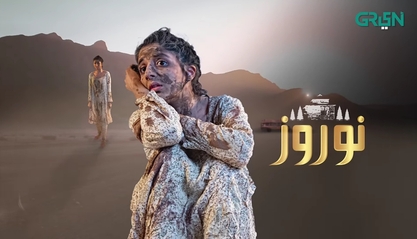“Nauroz” captured the audience attention from the first episode itself, telling the story of a young girl raised in a basement who is introduced to the world outside under strange circumstances. Starring Mawra Hocane, Shamyl Khan, Rana Majid Khan, Mahnoor Shaukat and Manzar Sehbai, the story has been written by Kashif Anwar and directed by Shahzad Kashmiri.
The highlight of the finale comes in the form of the intense face-off between fan-favorite Rustam (Rana Majid Khan) and Kaaravan Khan (Manzar Sehbai). Rustam is captured in his attempt to murder Kaaravan Khan and his son and the two torture him in order to extract information about Reshtina’s (Mawra Hocane) whereabouts. Rustam has been intensely loyal to Reshtina and has made it his purpose in life to sacrifice his life for her happiness. This is out of love, of course, but it also comes from a place of guilt, realizing he has lived his life on the wrong path and is ready to die on the right one – and he does. Rana Majid Khan has been exceptional throughout the running of “Nauroz,” becoming a favorite of the audience, fans rooting for Rustam and Reshtina despite understanding how different they are. Rana Majid Khan has exuded lead character energy and deserves to play the lead in the future. Producers and directors, please take note!
Reshtina, finding out about Rustam’s death, is compelled to take action, no longer satisfied with hiding. Mawra Hocane plays this scene brilliantly. Rustam was a close acquaintance, someone who helped Reshtina in the toughest of times and helped her a lot without her even asking – but Rustam did not mean as much to Reshtina as she did to him. Does that make her ungrateful? No, it simply means Reshtina recognized that Rustam’s life and her life were too different. However, the way Mawra plays Reshtina’s reaction is brilliant, her expression filling with horror and recognition that not only did Rustam sacrifice himself for her, but her grandfather is also responsible for his death. This pushes Reshtina towards the face-off we’ve all been waiting for as she informs Kaaravan Khan that she’s the granddaughter he’s been trying to kill – and she has filed an FIR against him.
There’s something “off” about the way Manzar Sehbai’s Kaaravan Khan has been written. After the confrontation, Kaaravan Khan seems impressed with Reshtina, hailing her as a daughter worthy of their family, a strong woman – and then, in the next moment, he’s off to murder her once again. Manzar Sehbai has played this role so well, depicting Kaaravan Khan with a certain menacing quality that evokes fear – but he could have been better written on paper. Rustam’s intentional death is the trigger for Reshtina’s uncle, one nonsensical death too many, Rustam’s sacrifice almost snapping him out of a trance. He is frozen, unable to murder his own niece, seeing his own brother in her. And it’s this moment of pause and rebellion which saves Reshtina’s life, the police arriving to arrest the deadly duo.
In the end, all’s well that ends well with Shayan and Reshtina visibly “together,” though their marriage isn’t necessarily mentioned. This is a green flag couple, a couple who are full of positivity and ideas to change the world – and yet, the chemistry shared by Rustam & Reshtina was far more appealing. In the end, we are robbed of a Salar and Reshtina reunion. We’ve obviously seen the two interact twice and we see them seated in the same room, but we do not ever see Salar recognize or realize that Reshtina is his blood sister. At one point, audiences were hoping Salar would wind up being Reshtina’s protector, a man who joined forces with his sister to combat their villainous grandfather. Unfortunately, Salar simply winds up being a footnote in the entire story, his son and wife playing more of a role than he ever does. This is disappointing.
Mawra Hocane is an actress who seems to take on roles which will make an impact in an intellectual way. She has been the star of “Nauroz,” beautifully portraying Reshtina, an innocent thrown into our ruthless world. She has enacted Reshtina’s progression and awareness in a natural way, allowing her to grow, learn and find her voice. Take a bow! “Nauroz” ends effectively with many positives, showing how we should fight for what’s right, use social media and our voice for a good cause, depicting positive female relationships (credit to Mahnoor Shaukat as Hira) and even a good bit of stress on environmental awareness. But the strength of “Nauroz” remained with the storytelling focused on Reshtina’s upbringing with the excellent Shamyl Khan, her introduction to the “real” world and the sequences depicting Reshtina’s bond with Rustam and Mahnoor.
